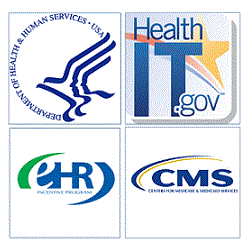 Keep Posted on HHS with this Health IT News
Keep Posted on HHS with this Health IT News
The Department of Health & Human Services (HHS) is responsible for protecting the health of the US population and provide essential human services. It denotes almost one quarter of the federal government’s expenses and awards more grant money than all other federal agencies combined. HHS’ Medicare program is the nation’s largest health insurer and Medicare and Medicaid recipients are one in four of all Americans. CMS and ONC are two of many Offices and Agencies that make up HHS that are driving health IT adoption initiatives. AHRQ, NIH, CDC, OCR, and HRSA all have integrated parts to health IT adoption initiatives too. Check in here to keep posted on HHS and the quest for the age of digital health care with health IT news.
From the HHS Newsroom
HHS strengthens patients’ right to access lab test reports
As part of an ongoing effort to empower patients to be informed partners with their health care providers, the Department of Health and Human Services (HHS) has taken action to give patients or a person designated by the patient a means of direct access to the patient’s completed laboratory test reports. The final rule amends the Clinical Laboratory Improvement Amendments of 1988 (CLIA) regulations to allow laboratories to give a patient, or a person designated by the patient, his or her “personal representative,” access to the patient’s completed test reports on the patient’s or patient’s personal representative’s request.
HHS Issues Model of Notices of Privacy Practices in Spanish
A Spanish version of the Model Notices of Privacy Practices (NPP) has been issued by the U.S. Department of Health and Human Services Office for Civil Rights (OCR) and Office for the National Coordinator for Health Information Technology (ONC). These materials were developed through focus group testing with Spanish speakers. This resource provides patients and health plan subscribers culturally competent information about their rights under the Health Insurance Portability and Accountability Act (HIPAA) Privacy Rule.
From the AHRQ Newsroom
EHR Functionality To Support Primary Care Webinar
When: February 28, 2:30 p.m. to 4:00 p.m. ET
Register for this event.
AHRQ is hosting a webinar on EHR functionality needed to support primary-care delivery. The expert panel will discuss the need for EHRs to move beyond documentation to interpreting and tracking information over time, supporting patient partnering activities, enabling team-based care, and allowing providers to use population-management tools to facilitate care delivery.
Studies Show Computerized Decision Tools Can Aid Acute Coronary Syndrome, Pulmonary Embolism Diagnoses
Report in the February Newsletter, a new AHRQ-funded research finds that computerized diagnostic testing can help clinicians assess whether their patients are suffering serious, acute cardiovascular events such as heart attacks. Traditionally, pretest probability assessment—in which clinicians use their experience to discern whether a patient is in danger—has played a central role in diagnosis. This clinical judgment, or “doctor’s best guess,” can help reduce unnecessary and dangerous testing.
From the ONC Newsroom
Progress on Health IT Safety Plan with release of the SAFER Guides
A new set of guides and interactive tools to help health care providers more safely use electronic health information technology products, such as electronic health records (EHRs), are now available at http://www.healthit.gov/policy-researchers-implementers/safer. The Office of the National Coordinator for Health Information Technology (ONC) at HHS released the Safety Assurance Factors for EHR Resilience (SAFER) Guides. These guides are a suite of tools that include checklists and recommended practices designed to help health care providers and the organizations that support them assess and optimize the safety and safe use of EHRs.
